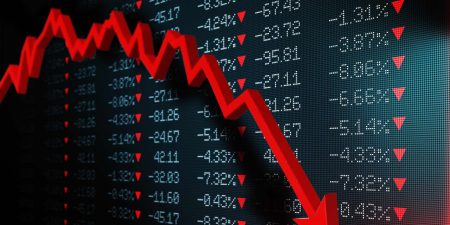Crypto assets have enjoyed a stellar 2023 and the new year could bring even more joy through the approval of the first batch of spot Bitcoin exchange-traded funds (ETFs). Two filings Tuesday from one potential issuer—
Grayscale Bitcoin Trust
—appear to move that closer to a reality.
Grayscale filed an amendment to its ETF application, a concession that should improve its chances of approval. Chairman Barry Silbert will also step down from Jan. 1, along with fellow board member Mark Murphy. The Securities and Exchange Commission (SEC) set a deadline of Dec. 29 for issuers to amend their applications and the flurry of activity ahead of that date is being welcomed by crypto investors.
It’s been quite the year for crypto. Bitcoin prices plumbed a multiyear trough and broker
Coinbase Global’s
stock hit a record low in early January 2023, in the depths of a brutal bear market. Bitcoin has since soared more than 150% higher, returning to levels not seen since before the worst of the 2022 selloff, and Coinbase shares have almost quintupled.
The rally really began over the summer, when BlackRock and other financial stalwarts filed for spot Bitcoin ETFs, and legal momentum built behind hopes that the SEC would approve them.
These ETFs are expected to usher in a fresh wave of investor interest. Add into the mix the so-called halving—a change to Bitcoin’s programmatic monetary policy that should cut token issuance next year—and gains could be supercharged.
That traders now expect the Federal Reserve to cut interest rates multiple times in 2024 hasn’t hurt, either. Cryptos still tend to trade like stocks and other risk-sensitive assets, and rate cuts would be another tailwind.
The SEC could approve the first spot Bitcoin ETF in early January. The halving is anticipated to come around April. While some analysts are doubtful Bitcoin can keep climbing—this is all priced in, they say—there is no doubt the first half of 2024 will be full of crypto catalysts.
—Jack Denton and Callum Keown
***
Apple Appeals Watch Ban After Biden Administration Setback
Apple’s hopes that a recent ruling banning it from selling several models of the Apple Watch in the U.S. could be overturned were dashed by the Biden Administration Tuesday. The issue was centered on a patent-infringement issue.
- The United States International Trade Commission (ITC) found in October that Apple infringed two patents held by the medical-technology company Masimo and a sister company called Ceracor Laboratories on sensors that measure blood-oxygen levels. The ITC ruling covers both the Apple Watch Series 9 and the Apple Watch Ultra 2.
- That finding was subject to review by U.S. Trade Representative Katherine Tai, so there was still hope for Apple. But, her office has now issued a statement saying that “after careful consultations,” she has decided not to reverse the ITC determination, which goes into effect Tuesday.
- Apple has stopped selling Series 9 and Ultra 2 watches in the U.S. and filed an appeal of the ITC ruling to the Federal Circuit court, which has the power to review ITC cases. “We strongly disagree with the U.S. ITC decision and resulting exclusion order, and are taking all measures to return Apple Watch Series 9 and Apple Watch Ultra 2 to customers in the U.S. as soon as possible,” it said in a statement.
What’s Next: Apple said it is pursuing a range of legal and technical options to resume sales of Apple Watch Series 9 and Apple Watch Ultra 2, and has submitted a proposed redesign for both models for U.S. regulatory approval.
—Eric J. Savitz
***
U.S. Home Prices Rose To Record Highs in October
U.S. home prices rose at a 4.8% annual rate in October, the fastest such gain since December 2022, the S&P CoreLogic Case-Shiller Home Price Indices reported. Home prices in 20 major cities and the broader national index are at all-time highs.
- Home prices gained 0.6% in October on a seasonally adjusted basis from September, the data show—slightly slower than September’s 0.7% gain. Separately, the Federal Housing Finance Agency reported that home prices rose 0.3% in October month over month, and were up 6.3% in the past year.
- As mortgage rates rose to nearly 8% at the end of October, per Freddie Mac data, prices remained high, numbers from Case-Shiller and the National Association of Realtors showed. Closings of existing-home transactions fell to a 13-year low in October as deals dried up.
- An index measuring prices in 20 of the nation’s large metropolitan areas rose 4.9% from October 2022, gaining a seasonally adjusted 0.64% from September. But economists were expecting a 5.1% year-over-year bump and 0.65% monthly gain, according to FactSet.
- Of the 20 cities in the index, home prices rose the most in Detroit, up 8.1% from last October, followed by San Diego (up 7.2%) and New York City (7.1%). Portland, Ore., was the only city where prices fell.
What’s Next: “With mortgage rates dropping, demand for homes in early 2024 is likely to be strong and will again put pressure on prices,” CoreLogic chief economist Selma Hepp said. She expects most markets will reach new home-price highs in 2024, MarketWatch reported.
—Janet H. Cho
***
Bristol Myers, AstraZeneca Deals Show Biotech M&A Is Back
Biotech M&A is back in a big way. Bristol Myers Squibb will acquire radiopharmaceutical therapeutics company
RayzeBio
for $62.50 a share in cash. Other Biotech stocks are benefiting from the action in the sector, which has suffered a tough year.
- The Bristol Myers Squibb acquisition price is more than a 100% premium over RayZeBio stock’s closing price of $30.57 on Friday. In a press release on Tuesday, the companies said the total equity value of the deal is about $4.1 billion.
- In a bumper period for deals, AstraZeneca said Tuesday it would buy Gracell Biotechnologies in a deal valued at $1.2 billion. These are just the latest acquisitions: Nine of the 20 biotech acquisitions worth $1 billion or more announced so far this year have come since the start of October, according to the website BioPharma Dive.
- It’s basically been a year of two halves, with the second half yet to boost stocks. The equal-weighted SPDR S&P Biotech ETF XBI, which trades under the ticker symbol XBI, has gained 5.6% so far this year, while the market capitalization-weighted iShares Biotechnology ETF IBB, which trades as IBB, has risen 1.9%. Both are well behind the S&P 500’s SPX 24% rise.
What’s Next: High interest rates are probably what caused the slow start to the year. It’s not a coincidence that the turnaround in the sector has come just as conditions began to turn right for the Federal Reserve to consider rate cuts instead of hikes. Many biotech stocks, particularly small ones, are reliant on borrowed capital to conduct research as they look for the next big blockbuster drug.
—Ben Levisohn, Joe Woelfel, and Angela Palumbo
***
Holiday Shopping Grew 3.1% This Year, Mastercard SpendingPulse Says
Americans spent 3.1% more this holiday season than they did last year, excluding car sales, according to preliminary data from Mastercard SpendingPulse. Healthy job creation and easing inflation pressures empowered consumers to shell out between Nov. 1 and Dec. 24.
- “This holiday season the consumer showed up, spending in a deliberate manner,” said Michelle Meyer, chief economist at Mastercard Economics Institute. Mastercard’s preliminary figure is slightly less than its projection that sales would rise by 3.7% year over year, and below the growth recorded in the past three years.
- Despite fears that consumers would spend less this year, Mastercard’s data suggest many Americans returned to their prepandemic shopping habits, said Steve Sadove, senior advisor for Mastercard. Restaurant spending jumped 7.8% from last year, and grocery sales increased 2.1%.
- Continuing a trend from Black Friday weekend, when online sales hit record highs, many consumers prefer online shopping. Online retail sales rose by 6.3% this year, according to Mastercard, outpacing bricks-and-mortar stores’ 2.2% gain.
- Meanwhile, people returned a total of $743 billion in merchandise in 2023, or 14.5% of sales, according to the National Retail Federation (NRF) and Appriss Retail. Consumers returned 17.6%, or $247 billion of merchandise bought online, compared with 10.0%, or $371 billion, of in-store purchases.
What’s Next: Retailers have seen an uptick in return fraud, comprising $101 billion in overall losses, including “wardrobing,” or returning used, non-defective merchandise; returning goods bought with fraudulent or stolen tender; and returned items from organized retail crime groups, the NRF said.
—Janet H. Cho
***
—Newsletter edited by Zoe Szathmary, Patrick O’Donnell, Rupert Steiner
Read the full article here















